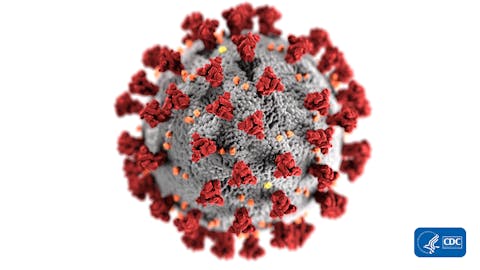In this piece, we will take a look at the 12 best covid treatment stocks to buy today. For more stocks, head on over to 5 Best Covid Treatment Stocks to Buy Today.
If there’s one thing that can be said for sure, it’s that the coronavirus pandemic has changed the world. The deadly disease, which first surfaced in 2019 and rapidly spread all over the world in 2020 became one of the deadliest pandemics in human history. Death toll from the coronavirus pandemic is staggering as well, with data from the World Health Organization (WHO) suggesting that as of March 16, 2023, 6.8 million people have lost their lives to the virus; a figure that pales in comparison to the 760 million confirmed cases of the virus.
These staggering figures have an economic cost to them as well, which naturally cannot be compared to the loss of life. Still, if the number of infections and deaths did not stun you, perhaps the projected economic costs will. According to estimates from the International Monetary Fund – a global body that aims to help distressed economies – the coronavirus COVID-19 pandemic will cost the world a whopping $12.5 trillion by 2024. For reference, the global economy was estimated to sit at $96 trillion in 2021 according to estimates from the world bank, so if the IMF’s forecast bears fruit, then the economic damage from the virus will have eaten out a significant chunk of global economic output.
Still, the pandemic also saw an unprecedented global response where vaccines were flown around to all corners of the world to aid the battle against the coronavirus. The WHO also estimates that as of March 11, 2023, a stunning 13 billion vaccine doses have been administered worldwide. Using the World Bank’s population estimates from 2021, which place the global population at 7.8 billion, almost two vaccine doses per person have been administered so far – an achievement that has undoubtedly played a pivotal role in containing the virus. The rapid vaccination has ensured that as the world entered 2023, the trend of coronavirus deaths and cases began to drop from earlier peaks that took place at different times in different places of the world.
At the same time, the number of treatments and vaccines available in the fight against the virus has also significantly grown. While initially, particularly in the Western world, a handful of vaccines from Moderna, Inc. (NASDAQ:MRNA), Pfizer Inc. (NYSE:PFE), BioNTech SE (NASDAQ:BNTX), AstraZeneca PLC (NASDAQ:AZN), and Johnson & Johnson (NYSE:JNJ) were available, nowadays, a lot of new players have entered into the market.
These companies are entering a market that grew from no value to one spanning billions of dollars in a short time period. A research report from the WHO estimates that $141 billion of vaccines were shipped globally in 2021, for an approximately 3.5x growth from 2021 – demonstrating the scale of the global response against the pandemic. At the same time, it indicates that vaccine manufacturing is still a highly specialized process, with ten manufacturers accounting for 70% of all the vaccines shipped. Zooming in on the coronavirus vaccine market itself, Transparency Market Research estimates that the segment was valued at $92.6 billion in 2021 and is expected to record a negative compounded annual growth rate (CAGR) of 13.6% between 2022 and 2031 to sit at an estimated $9.9 billion by the end of the forecast period. To cater to this dropping value, the research firm believes that the market participants will have to inform the general public about the benefits of herd immunization, as well as leverage their existing vaccine development experience to develop products for other diseases as well. At the same time, it also points out that the market can grow due to potential new variants of the virus that render older vaccines obsolete and require already vaccinated individuals to get additional doses. North America is estimated to be the most valuable vaccine market, with Europe coming in at second place.
Pivoting from existing vaccine development experience to create new products is a trend that has already emerged in the market. The clearest example of this is Moderna, Inc. (NASDAQ:MRNA), a company that few people had heard about prior to the pandemic and its Spikevax vaccine that was one of the most – if not the most – effective treatments to prevent severe viral infection. At its latest earnings call, the firm’s president, Mr. Stephen Hoge shed some light on its diverse portfolio of fighting other respiratory infections, as he outlined:
Lastly, our respiratory portfolio includes a large number of combination vaccines to provide protection against multiple respiratory pathogens which has advantages for many stakeholders, including healthcare providers, payers and consumers. These include combinations of COVID, flu and RSV as well as two pediatric vaccines that include additional viruses that are important in children, including hMPV and PIV3. As we prepare for endemic COVID in 2023 and beyond, we wanted to briefly recap the recent VRBPAC committee discussions and recommendations. At the January VRBPAC meeting, the committee voted to harmonize the primary series and booster dose vaccines, which is an important step to simplify future guidance. The FDA also indicated that it expects to convene VRBPAC to determine vaccine strain composition for the €˜23/24 season in the second quarter of this year.
We believe that our mRNA platform has demonstrated its ability to deliver variant match vaccines on accelerated time horizons and we believe we are therefore well positioned to deliver whatever composition update the FDA and other public health agencies recommend. And moving to RSV, as you know, we shared the top line results from our Phase 3 RSV study in older adults earlier this year. And today, we shared additional data that was presented this morning at RSVVW. The top line results we have seen are incredibly encouraging and we are grateful to the FDA for breakthrough therapy designation for mRNA-1345, which further emphasizes the significant health impact of RSV in older adults and the high unmet need. In the top line data presented in January, the mRNA-1345 demonstrated 83.7% vaccine efficacy and the primary endpoint of lower respiratory tract disease with two or more symptoms.
Today, we’ll look at some covid treatment stocks, a list that also includes GSK plc (NYSE:GSK), BioNTech SE (NASDAQ:BNTX), and Novavax, Inc. (NASDAQ:NVAX).

Our Methodology
We sifted through pharmaceutical companies to pick out which make coronavirus treatments and checked their popularity with hedge funds. However, some companies that have recently developed treatments are also included, since they were not a part of the latest hedge fund data which covers investor sentiment in December 2022.
12 Best Covid Treatment Stocks to Buy Today
1. Johnson & Johnson (NYSE:JNJ)
Johnson & Johnson (NYSE:JNJ) is one of the largest healthcare companies in the world. It makes and sells pharmaceutical products, and was one of the first to develop a coronavirus vaccine. The firm is headquartered in New Brunswick, New Jersey.
Insider Monkey’s fourth quarter of 2022 survey covering 943 hedge funds revealed that 84 had bought the firm’s shares. Johnson & Johnson (NYSE:JNJ)’s largest investor in our database is Ken Fisher’s Fisher Asset Management which owns six million shares that are worth $1 billion.
Along with GSK plc (NYSE:GSK), BioNTech SE (NASDAQ:BNTX), and Novavax, Inc. (NASDAQ:NVAX), Johnson & Johnson (NYSE:JNJ) is another covid treatment provider.
2. Eli Lilly and Company (NYSE:LLY)
Eli Lilly and Company (NYSE:LLY) is an American company headquartered in Indianapolis, Indiana. The firm provides treatments for deadly diseases such as cancer, lymphoma, anxiety, and others. Additionally, it also makes bamlanivimab and etesevimab treatments for mild covid.
By the end of December 2022, 76 of the 943 hedge funds surveyed by Insider Monkey had invested in Eli Lilly and Company (NYSE:LLY). The firm’s largest shareholder is Ken Fisher’s Fisher Asset Management which owns 3.9 million shares that are worth $1.4 billion.
3. Pfizer Inc. (NYSE:PFE)
Pfizer Inc. (NYSE:PFE) is one of the largest pharmaceutical companies in the world. It provides medicines for mental health disorders, cancers, and other diseases. It was also one of the first companies to develop a COVID treatment and the first to receive an emergency FDA authorization.
Insider Monkey dug through 943 hedge funds for their fourth quarter of 2022 investments to find out that 75 had bought the company’s shares. Pfizer Inc. (NYSE:PFE)’s largest shareholder is Clif Asness’ AQR Capital Management which owns 9.8 million shares that are worth $502 million.
4. Gilead Sciences, Inc. (NASDAQ:GILD)
Gilead Sciences, Inc. (NASDAQ:GILD) is an American firm headquartered in Foster City, California. It develops treatments for hepatitis, AIDS, and other diseases. The firm’s Veklury drug is for individuals with mild covid symptoms, to prevent the disease from progressing further.
As of Q4 2022, 64 of the 943 hedge funds part of Insider Monkey’s database had bought Gilead Sciences, Inc. (NASDAQ:GILD)’s shares. Its largest shareholder in our database is Jim Simons’ Renaissance Technologies which owns 9.2 million shares that are worth $790 million.
5. Moderna, Inc. (NASDAQ:MRNA)
Moderna, Inc. (NASDAQ:MRNA) is an American firm that is headquartered in Foster City, California. The firm’s Spikevax vaccine was one of the first highly effective treatments in the world.
By the end of last year’s fourth quarter, 52 of the 943 hedge funds polled by Insider Monkey had invested in the company. Out of these, Moderna, Inc. (NASDAQ:MRNA)’s largest investor is Philippe Laffont’s Coatue Management which owns 6.3 million shares that are worth $1.1 billion.
6. Regeneron Pharmaceuticals, Inc. (NASDAQ:REGN)
Regeneron Pharmaceuticals, Inc. (NASDAQ:REGN) is an American company headquartered in Tarrytown, New York. The firm makes the REGEN-COV coronavirus vaccine, which uses a mix of antibodies to fight the virus.
By the end of last year’s December quarter, 47 of the 943 hedge funds polled by Insider Monkey had bought Regeneron Pharmaceuticals, Inc. (NASDAQ:REGN)’s shares. The company’s largest investor is Cliff Asness’ AQR Capital Management which owns 309,155 shares that are worth $221 million.
7. AstraZeneca PLC (NASDAQ:AZN)
AstraZeneca PLC (NASDAQ:AZN) is a British company headquartered in Cambridge, United Kingdom. The firm makes prescription diseases for respiratory diseases, viruses, and cancers. It has shipped billions of doses of its vaccine to more than 150 countries all over the world.
Insider Monkey’s Q4 2022 survey covering 943 hedge funds revealed that 42 had bought AstraZeneca PLC (NASDAQ:AZN)’s shares. The firm’s largest investor is Rajiv Jain’s GQG Partners which owns 17 million shares that are worth $1.1 billion.
GSK plc (NYSE:GSK), AstraZeneca PLC (NASDAQ:AZN), BioNTech SE (NASDAQ:BNTX), and Novavax, Inc. (NASDAQ:NVAX), Johnson & Johnson (NYSE:JNJ) are some of the top coronavirus treatment providers.
Click to continue reading and see 5 Best Covid Treatment Stocks to Buy Today.
Suggested Articles:
- 10 Best Canadian Gold Stocks to Buy
- 20 Largest Semiconductor Companies in the World
- 12 Best Aerospace Stocks To Buy
Disclosure: None. 12 Best Covid Treatment Stocks to Buy Today is originally published on Insider Monkey.





